If you’re familiar with us at Athlete Assessments, you might know we’re big believers in gender equality and are passionate about equal rights, equal pay, equal opportunity, and equal recognition, not only for female athletes, but for women in general.
Education and information surrounding gender equality and equal rights has been on the rise, more accessible, and discussed by the broader community. As a young woman myself, I can’t remember a time from my adolescence where equality wasn’t an important topic of discussion being had around me.
Moving into my adult years, I have had the opportunity to critically analyze and reflect on my time growing up, both in and out of the realms of sport, and upon reflection have been able to see times where inequality was prevalent, both in my own and other’s experiences.
Most kids are encouraged to try most sports at least once. Sport provides a unique environment for kids to play, learn, get involved, and make friends that they otherwise would not have. But currently, despite the encouragement to get involved in sport, should a little girl choose to take her sport further one day and potentially pursue it as a career, the opportunities available are lacking when compared to those of her male counterparts in all but a few sports.
The debate around gender equality in sports remains a controversial topic, unfortunately. Even the founder of the modern Olympics, Baron Pierre de Coubertin, said in 1896, “No matter how toughened a sportswoman may be, her organism is not cut out to sustain certain shocks.”
Now we’ll be the first to say that the sporting industry is making steps towards an equal future. However, there is still a way to go. Sport has long mirrored society, so the discrepancy in equal pay between men and women has persisted within sport, just as it has in other professions.
2019 was a defining year in soccer for the conversation as the public showed their support for gender equality and in return we were provided with an insight from female athletes into the jobs and lives they must lead outside of their professional sporting career. The debate that had been simmering under the surface and was often confined as a topic of family barbeques or gatherings amongst friends, was ignited and reinvigorated globally in 2019 after the U.S. Women’s National Soccer Team (USWNT) won the World Cup and the crowd chanted “Equal Pay!”.
That same year, the Women’s Sport Foundation highlighted some of the women in sport leading the charge in the fight for equal pay. In advance of their World Cup win, the USWNT took a stand against ‘institutionalized gender discrimination’ against the team. The women’s team has performed exceedingly better than their male counterparts, who in 2018 failed to even qualify for the men’s World Cup. While the women have placed in the top three in every women’s World Cup since 1991 when the tournament began.
Looking to hockey, the U.S. Women’s National Ice Hockey Team, prior to their historic gold medal in the 2018 PyeongChang Olympics, were fighting for equal pay and treatment to that of the men’s team. The New York Times reported that at that time the women were barely scraping a living wage and were left out of pre-Olympic marketing plans despite their continued success as a team. Their star forward Hilary Knight said: “We’re passionately pursuing something for the greater good.”
One of the most well-known and on-going debates, even today in 2021, are the salaries of the WNBA and their NBA counterparts. It is known that most professional women basketball players, in order to make a sustainable income playing basketball, need to compete in numerous different national leagues. This creates an extreme physical demand on the athletes by not having an off-season as they are playing in Europe, Russia, China, and Australia to make ends meet. However, it is really important to note that the WNBA players are not asking for the multimillion-dollar figure incomes that their NBA counterparts receive, they are asking for percentage equity (more on this later).
Close to home, I remember having the conversation with one of my childhood friends who has gone on to play in the AFLW. We were discussing her training and game schedule, in and out of season, and I was shocked to learn that despite her and her teammates being required to train and play the same amount of times a week as their male AFL counterparts, they were being paid 20% of what their average male counterpart was earning per game, however they were not being paid a salary for training at all, meaning they all needed to sustain full-time jobs outside of their full-time training and playing schedule. Whereas their male counterparts are being paid as full-time athletes. In that same year, the AFLW Grand Final broke their attendance record with more than 53,000 fans rolling into the stadium to watch. It was also the biggest audience for a women’s sporting event in Australia, ever.
“Focus, determination, pain, disappointment, excitement, suspense, anger, relief: it’s all a part of the game whether you are a man or a woman.”
Annie Spewak, former lacrosse player and junior at Robert Morris University studying Public Relations.
Gender Equality – the stats!
Women make up 40% of sportspeople, however as of 2020 they continue to only receive 4% of the total sports media coverage in print and broadcast devoted to them. This is even despite fluctuations during key events like the Olympics or World Cup.
Since media coverage has been demonstrated to directly impact a sport’s ability to attract and maintain commercial sponsorships, a lack of coverage can have a significant impact on the sustainability of female athletes, sports, and competitions. The 2017 Intergenerational Review of Australian Sport highlighted that in Australia only 8% of sponsorship is directed towards women’s sport and 7% of broadcast coverage.
According to the Women’s Sports Foundation, male athletes get $179 million more in athletic scholarships each year than females do. Additionally, collegiate institutions spend just 24% of their athletic operating budgets on female sports, as well as just 16% of recruiting budgets and 33% of scholarship budgets on female athletes.
The Women’s Sports Foundation also reported that the NBA pays its players 49-51% of the league’s revenue, while WNBA players take home a maximum of 22.8%. The equity in these sports come from percentage matching not dollar, as without the players the WNBA wouldn’t be able to generate the revenue it does.
According to the Australian Bureau of Statistics, the median full-time annual income for men that are classified as a sportsperson (includes athletes from all levels that earn money from their sport) is AU$67,652 (US$52,515). Women in this category earn AU$42,900 (US$33,301). That means on average female athletes are earning 63% of their male counterparts.
However, when we look at top-tier athletes, the pay gap is much larger. For example, in the soccer World Cup, if the Australian National Team, the Matildas, had won the entire competition, they would have received $4 million in prize money. That figure is just half of what the Socceroos earned for simply qualifying to play in the World Cup. However, it is also important to note that in 2019 under a new equal pay arrangement, the Matildas and Soceroos now receive an equal 24% share of an agreed cumulative of revenues generated by the National Team in 2019-20, rising by 1% each year.
Some people have the argument that “women’s sport isn’t interesting enough”. And even though over the years the popularity of women’s sports is growing, unfortunately the media coverage and sponsorship dollars haven’t necessarily followed through and gender equality remains an issue.
In 2015, the Women’s World Cup soccer final was the most watched soccer match—men’s or women’s—EVER in the US with nearly 25.4 million viewers. Yet the players were far less compensated than their male counterparts. Then, if we look again at the 2019 final, the women achieved a 22% higher viewership than the 2018 Men’s World Cup final.
“We are the best in the world, have three World Cup championships, four Olympic championships, and the men get paid more to just show up than we get paid to win major championships,”
Hope Solo, American Goalkeeper
So, what’s next?
Firstly, it’s important to ensure you and those around you are educated on what equal pay actually means. Equal pay means equal pay for the same amount of work under the same boss. The fight is asking for female and male athletes within the same level of teams, who have the same basic workload, responsibilities, and amount of matches, be paid the same basic wage by their sport’s governing body.
What it boils down to is that we all collectively, men and women, need to do more about gender equality. We need to pave the way for the next generation of girls and women, just as we do for boys and men. There should be no disparity in sports, in the workplace, or in life. All athletes should be seen as, and treated as, equals in all respects. Gender should not be the thing that defines us or separates us from our fellow athletes.
Let’s show the young girls everywhere that they can be whatever they want to be, and that they deserve to be paid equally for it too!
Other Fast Facts:
- According to a BBC sport survey, up to 83% of sports now offer the same amount of prize money for men and women. But in the 17% that don’t, the difference runs into the millions.
- Annually, boys get 1.13 million more sporting opportunities than girls.
- 4% of the total commercial investment in sport goes into women’s sport, despite a 2018 Nielsen report revealing that 84% of general sports fans have an interest in women’s sports.
- Only half of the governing bodies in sport currently meet the government target to have women making up one quarter of the people sitting around the boardroom table.
- When it comes to women’s sport, tennis is by far the most lucrative sport for female athletes.
- In the Forbes 2020 top 50 highest paid athletes, there is one woman, Naomi Osaka, is sitting at number #29.
- Coaches in women’s team sports at college level earn 63 cents for every dollar earned by head Coaches of men’s teams.
LOVE THIS ARTICLE?
DOWNLOAD YOUR FREE, PRINTABLE PDF COPY BY FILLING OUT THE FORM BELOW!
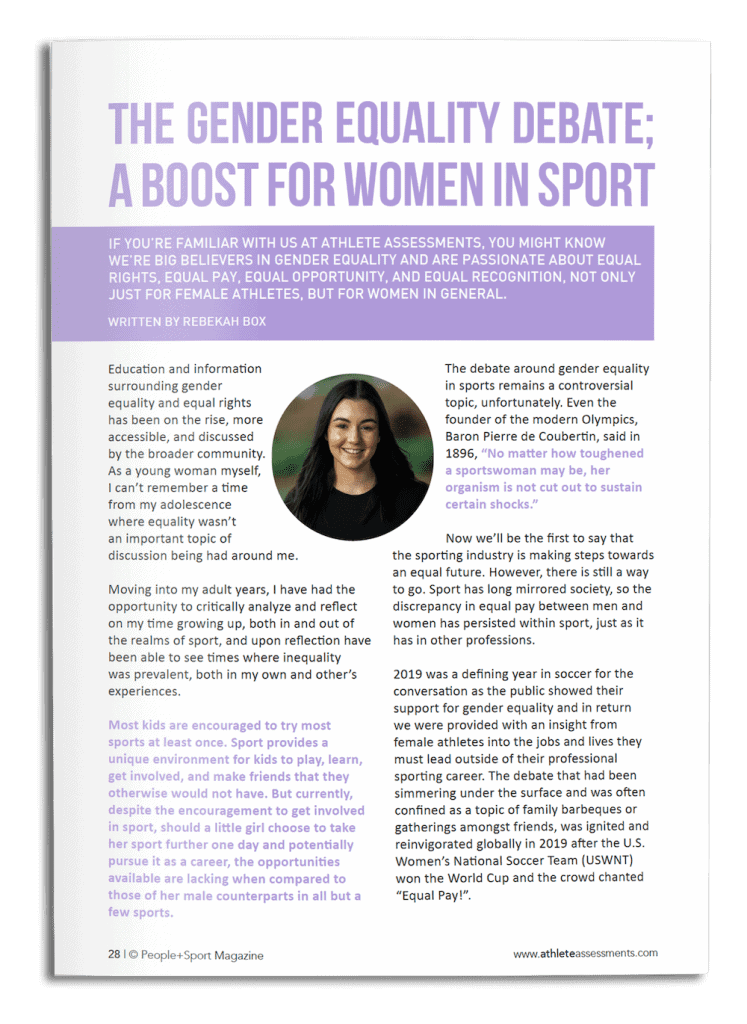
Where to from here?
At Athlete Assessments we’re huge supporters of equality of all kinds in sport, and are extremely proud to be working with some spectacular people who are constantly working towards achieving this. Read about how female former-student-athletes are blitzing the competition here.
We’re here to provide you with excellence in service and to help you be your best. If there is anything we can do to be of service, don’t hesitate to contact us.
Note from the writer; this article has been re-written in 2021 for International Women’s Day following the original publication in 2016.
Recommended Articles
The benefits of a strong and effective coach-athlete relationship has had the spotlight for some time now due to the intrinsic and positive links it has on performance. What’s interesting is coach-administrator relationships have come under increased scrutiny as research highlights poor athlete outcomes across the spectrum of collegiate and professional sports when these relationships breakdown. However, we’ve now seen that addressing this divide at the educational level is producing results in the real world. So, we spoke to Sara Lopez, Ph.D., Teaching Professor of the University of Washington’s unique Intercollegiate Athletic Leadership Master of Education about how.
Having the capability to lead plays a critical role in this effectiveness, so how do we actually develop leadership across diverse populations, ensuring to include those who may be reticent or hesitant to take on a leadership role? Jacqueline Mueller, a leadership expert renowned for bridging the gap between theory and practice acknowledges there’s no effective ‘cookie-cutter’ approach for teaching leadership, but simply put she says, “I try to invite participants to reflect on themselves and to find a way of leading that works for them.”
Success factors, critical inclusions, and applied strategies will be interwoven in a ‘how-to’ presentation on coach education by an international panel of sports’ top women leaders from WeCOACH, The Tucker Center, Athlete Assessments, Japan’s Juntendo University, at the 8th IWG World Conference on Women & Sport in Auckland, New Zealand, from November 14th-17th, 2022.
It takes a different skillset and a different mindset. Many incredible athletes have tried to make the transition and been unsuccessful. But there are a few who have got it right. Elissa Kent is one of these few.
Head Coach Ali Carey-Oliver achieved unprecedented success at Mt. San Antonio College after her women’s Volleyball program won their first ever Conference Championship with a perfect 8-0 conference record and an outstanding 20-4 season overall.
Congratulations to Quinnipiac University’s Women’s Rugby team who have finished an exceptional 2015 season by winning the inaugural varsity National Championship. In this article, Head Coach Becky Carlson shares her secrets to success.
Since moving to Quinnipiac University from her position with USA Rugby as an Emerging Sports Program Manager in 2011, Head Coach Becky Carlson has led her team to uncharted success, and has dramatically changed the landscape of Women’s Rugby in the United States. Before becoming the 2015 Champions, the Bobcats had competed in three of the previous four National Championship games, demonstrating that Coach Carlson has already forged a legacy of excellence at Quinnipiac.
Q&A with Stephanie Wheeler, Head Coach of the University of Illinois Women’s Wheelchair Basketball team and the USA Women’s Olympic team.
When it comes to wheelchair basketball, few have experienced the success Stephanie Wheeler has in her extensive career as a player and now Head Coach. Recently, Coach Wheeler took the University of Illinois all the way to the Championship game. We had a chance to catch up with Stephanie and to ask her some questions about her approach to becoming successful in the Coaching environment.


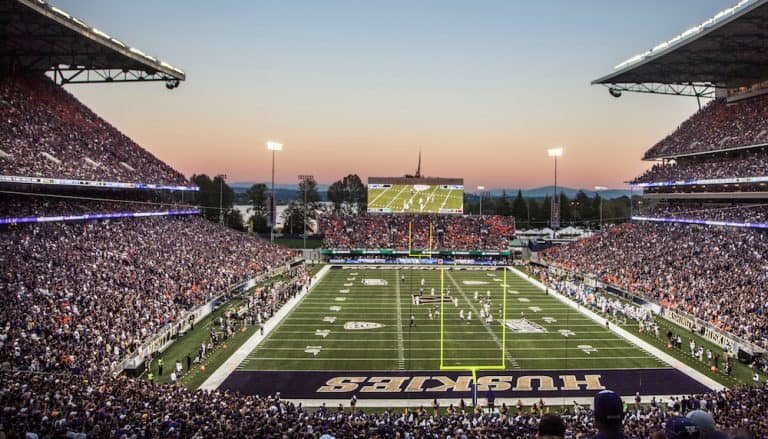

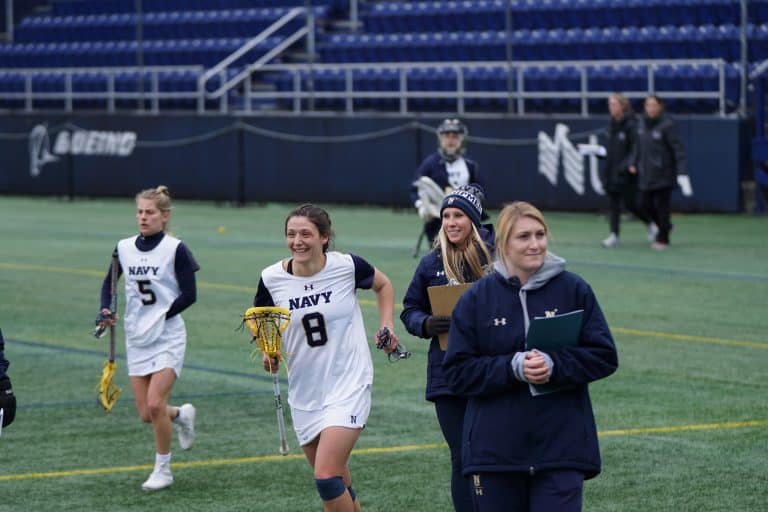
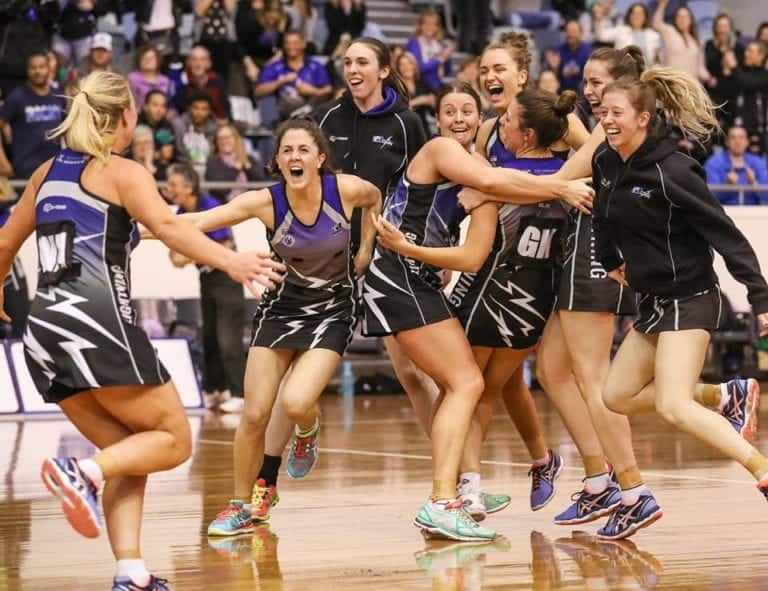
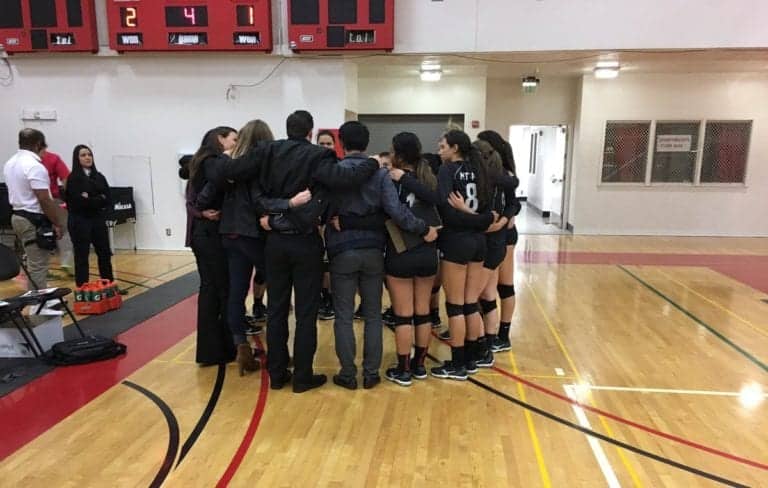
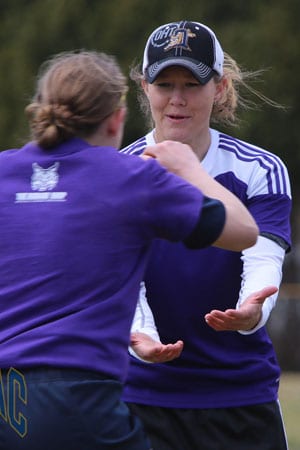
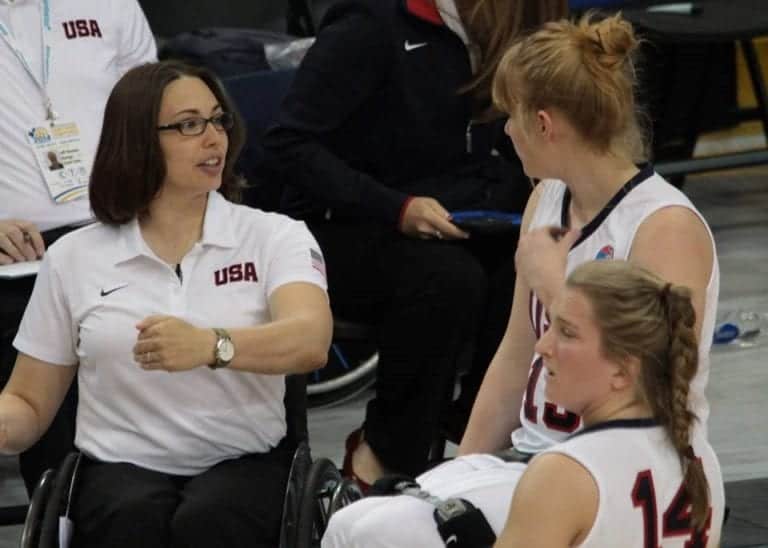
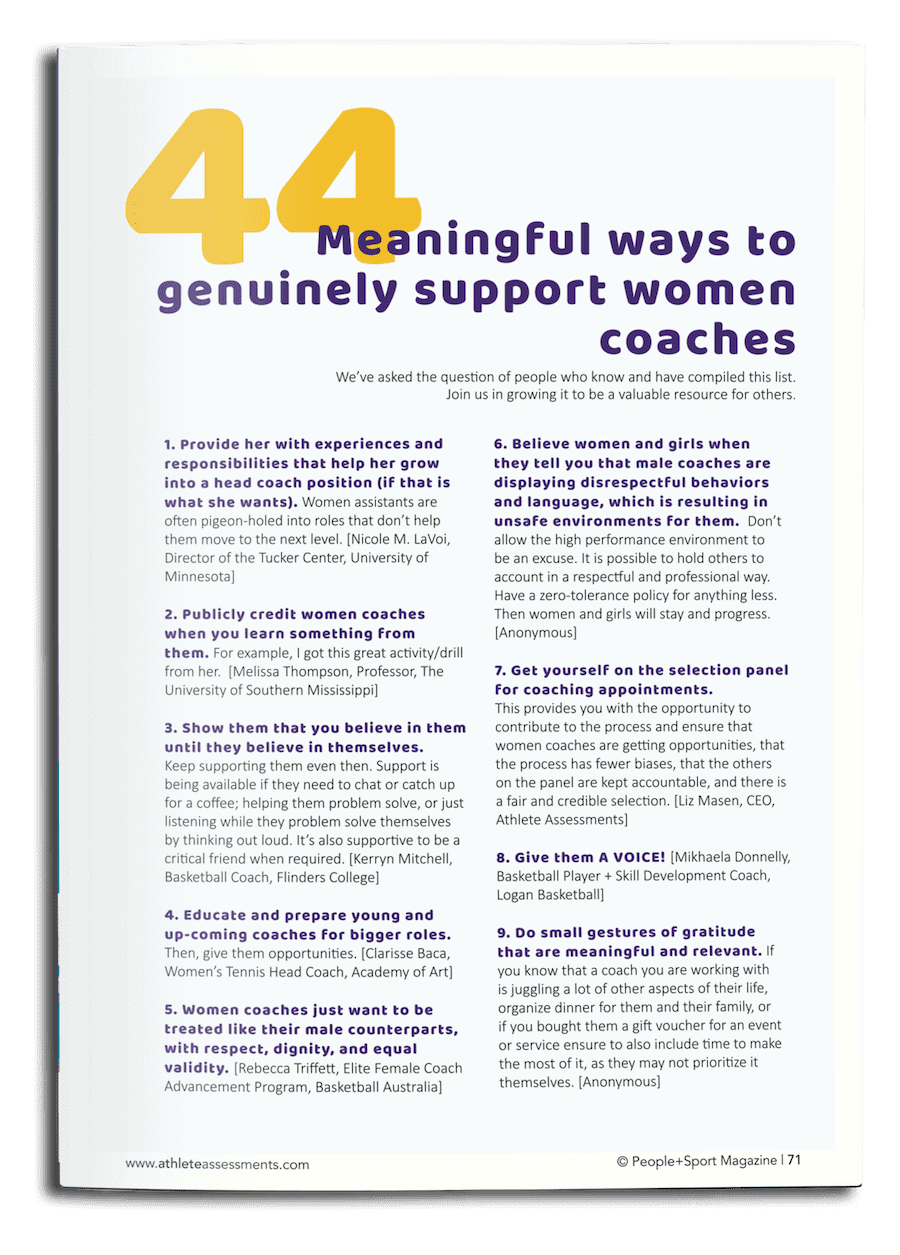
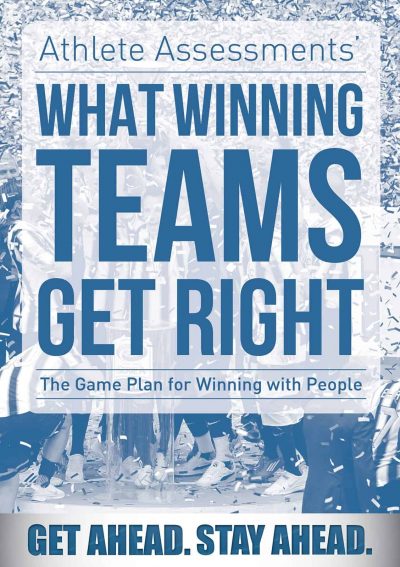



29 thoughts on “The Gender Equality Debate: A Boost for Women in Sport”
thank you so much, i am a girl who has a desire to become a womens soccer player one day. this gave me confidence, and i will feed on all the bad things people say about womens rights, and sports.
Thank you so much,I am a young woman and I want to be a tennis player like Venus Williams she is my idol and this article gave me confidence so again thank you
I love it, equal play = equal pay .. right?
Just like Ms Spewak stated “focus, determination..excitement, suspense.. it’s all part of the game”. Female athletes put just as much effort and make just as many sacrifices as the men in sport. It is crazy that people still have the attitude that women’s sport isn’t interesting enough! What make a men’s game so exciting that women cant deliver? I think this attitude towards women’s would change if they saw the Women’s World Cup grand final this year or the recent Matilda’s verse Brazil game. Whilst the media coverage for these events weren’t enormous, the crowds were there to support these girls!
If we want to see our daughters and granddaughters take part in sport, the gender equality in sport needs to be evened out. therefore, it’s time we even out the playing field.
#playfairpayfair
i understand what everyone is saying cause gender eaqulity-am i right its just so unfair. we all should be eaqul .
I wondering with all this talk of equality in sport, does this end with no male / female sport. Will there be just open tennis, or Olympic events where the strongest, fastest, the most skillful win no matter what gender they are.
That’s an interesting point, Jack! I guess we will have to wait and see what the future holds…
@Jack Ellis or it could end up with the equal opportunities and facilities for female athletes.
Guys Equality is a different issue. This is a scenario where we are supposed to talk about Equity. The sports should become more equitable so that even if women are playing alongside with men, the outcomes should not favor either one of the two.
That is a good point of view.
Thank you, this has helped me with my assignment
thx this helped a lot im doing a report in class and this artical gave me a lot of facts thank you so much
Does anybody know of any Projects that are in Place that aim to increase the involvement of women at management or coaching Level in sports in Europe?
We’re not too sure, Martin. Hopefully something happens soon.
We need equality for all!!!
If you have any understanding of economics, you will see that this article is severely flawed. What an athlete is paid (male or female) has a direct correlation to how popular the sport is. If there is a high market demand for a product (e.g. NFL or Premier League Football) then these sports will generate an enormous amount of revenue. The higher a revenue a sport makes, then the higher the wages an athlete will receive. The market interest directly translates to the money paid to an athlete.
For example, you can be the very best in the world in a multitude of sports or disciplines that have low public interest (e.g. hang gliding, canoeing, bmx riding) . These activities are undoubtedly skilled and impressive, but again the market interest will determine how much these people are paid. This is just fact. An world class football player who generates the interest of 50 million people will be paid more than a world class rock climber who generates the interest of 10,000 people. This is true no matter what gender you are.
I posted my well thought out and researched comment, but its not viewable, really gets the noggin joggin. why would it just disappear?
So il try again.
Yeah! this is so unfair #equaloutcomes #menaremean #gurlsrunthewurlds
amarite!
@Aliv Lojico
You are right. There is a correlation with how popular a sport is and the salaries of it’s athletes. However, this popularity comes from the amount of money invested into the sport as well. Take the SuperBowl for example : A ton of people tune in if only for the halftime show. The game’s popularity comes from how much money, time and coverage is invested into it. And how much is invested into it comes from it’s popularity. It is a vicious circle. This also goes for the level at which the athletes play. The quality of the game is often brought up as a reason that women sports have less support. But if we aren’t giving them the support they need then they cannot improve at the same pace. If the best coaches are always going for the higher salaries and the better coverage, then women athletes will never really be developing to their full potential.
yo thx my dude help out heeps with my assignments
Same as above but I noticed a pattern I have only seen women’s in inequality articles written by women that if I may say is very intriguing
I dream on becoming a female Basketball Player, but someone in my family says that I shouldn’t because I will fell isolated with no family too help me because I want too move from Australia- America. I also got told that I won’t get paid enough! I find it OUTRAGEOUS!!! I’m in Year 6 going into Year 7 at the same school and for years boys don’t pass me the Basketball- or any ball a lot because they are afraid that I am better than them. But not too brag I am kind of better than mostly all of them. I am doing a project about the WNBA and the respect all female athletes should receive and I would like too add some of your opinions. I won’t say your names of course, but I won’t take credit for it at all.
Hi Aimee
You are more than welcome to use any of our content, as long as you reference it to us.
My best
Abby
If you want to talk about inequality in sport then look into the current decision by Netball’s international federation to not recognize or support men’s netball at an international level! How would that be treated by feminism if the shoe was on the other foot and women were excluded from participating in what may be deemed a ‘male sport’ such as Rugby?
Inequality is a joke… It seems that she who screams loudest gets the media attention.
this has helped so much with mine as well! Thxs
Yes I will
thank you so much
Having women’s sports versions of any sport isn’t equal. If you want equality women will have to compete alongside men in the same events. Imagine if we had separate sporting events for tall and short people just because the short people were disadvantaged and less likely to win? I doubt ‘short’s sport’ would draw as much interest. Same could be said for any area where people have a natural advantage: Blacks and whites could compete separately – imagine the reaction to that! But it is true. Black people have a natural advantage in some sports and white people in others but everyone is happier if they all just compete together and do their best – that is real equality!
That was a great article. Right know I am doing a exhibition Project about gender equality in sport and this will be a lot of help
The article was great but the comments alone where fantastic with some great topics that needed to be brought up if we’re talking about gender equality as both come hand in hand.
More women need to watch sports. Generally many more men than women watch sports and being passionate about it. If more women are passionate about watching sports then their sports will grow bigger. In some sports like football and NFL and Rugby physical strength is key and women will never match the intensity and attraction of the male versions.
To make a living in sports it’s not just playing for your country. England football players actually donate theie allowance playing for their country to charity. They are paid huge amounts to play for their clubs.
How do you argue that women sports are just as interesting to watch when they play in a privileged women only competition and when not many women themselves watch women sports compared to men?
Missing the point? Ideally there is only the sport, male female together the quickest, the longest, highest scoring etc. Quotes, sexual equality issues, affirmative action only serve as distractions and won’t level-the-playing-field. Play, compete for the fun of it or groom for higher levels is fine, but professional and world sports champions are the best of the best.